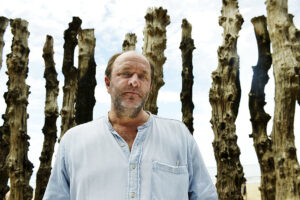Elite misbehaviour is the Ariadne’s thread, the unifying theme, running through Alan Hollinghurst’s oeuvre. From his debut novel, The Swimming-Pool Library, to his latest work, Our Evenings, his characters tend to be entitled toffs — or bourgeois parvenus with a ringside view of their milieu — who get up to all kinds of nastiness.
All too often, an admixture of careerism and cynicism prompts them to throw in their lot with the most reactionary causes, which, amplified by the tabloid press, lead to disastrous social consequences. The stakes vary, oscillating between well-heeled prissiness and outright skinhead violence directed against homosexuals and racial minorities. Hollinghurst, of course, is too clever to tax us with straightforward causality. He works through implication and omission. Allied to this Jamesian habit of mind is a very English scepticism of theory.
But theory is one thing, morality another. Hollinghurst’s mannered, swaggering debut unquestionably brims with it. The Swimming-Pool Library is nothing less than an indictment of the moral shortcomings of Britain’s ruling class. Set in 1983, the novel takes place in a world of prelapsarian promiscuity before AIDS permanently consumed the gay scene. Just down from Oxford and in no real need of a job, William Beckwith, a sinewy 20-something aristo, is able to take full advantage of it — “the sex-sharp little circuits of discos and pubs and cottages” — thanks to his grandfather’s fortune, prematurely handed over to him to avoid death duties. His aristocratic ennui is offset by his penchant for predatory sex with subalterns, men “vastly poorer and dimmer than himself — younger, too. I don’t think [Will’s] ever made it with anyone with a degree. It’s forever these raids on the inarticulate.” His is the proprietary lust of the possessing classes. “I must have him” is Will’s refrain, and what he wants, he usually gets.
An encounter with a queer peer, Charles Nantwich, in a public lav soon results in a friendship. Rather taken by Charles and his club, a happily old-fashioned institution full of men of “fantastic seniority”, Will agrees to write his biography. And so, in a pivotal scene, Will lights upon an astonishing find in Charles’s diaries. The poor chap’s life, he learns, had been destroyed by an up-and-coming Tory politician, who whipped up a moral panic over homosexuality after Charles had been caught soliciting. If that isn’t awful enough, it turns out that the person behind it all was in fact Will’s own grandfather. Will’s cheerfully disinhibited gay existence, in other words, had all along been sustained by proceeds from the original sin of gay oppression.
At the time of its publication, the politics of The Swimming-Pool Library attracted much less comment than did the sex. Naturally enough, readers were rather more taken by its concupiscent protagonist, unencumbered by such quaint notions as consent. Will, who divides his time between clubland and cottaging, pines for young black men: “Oh, the ever-open softness of black lips; and the strange dryness of the knots of his pigtails.” Arthur, of West Indian origin, fits the bill, and lets Will have his way with him: “after a few seconds’ brutal fumbling, [I] fucked him cruelly. He let out little compacted shouts of pain, but I snarled at him to shut up and with fine submission he bit them back.”
As it was, The Swimming-Pool Library was a tamer affair than The Folding Star, Hollinghurst’s answer to Lolita and Death in Venice. Here’s his narrator, Edward Manners, finally having it off with the object of his sexual fantasies, his precocious pupil Luc Altidore, a Flemish teenager, in the novel’s climax: “I was up on the chair, fucking him like a squaddie doing push-ups, ten, twenty, fifty… I had a dim sense of protest, postponed as if he wasn’t quite sure.”
Now, in Our Evenings, his latest novel, Hollinghurst bites back the gay sex. Gone, too, is the racial fetishisation of his early works. Reviewers have been quick to detect a note of repentance in the new novel, and The New Yorker, of all places, complained how boringly PC it is. Its narrator is a gay Anglo-Burmese actor; its themes, prejudice and parochialism in postwar British life.
But the contrast between Hollinghurst’s early and late style is overdrawn. True, veiny members “of a dimension” — as the hero of The Line of Beauty calls them with Jamesian portentousness — are out, but then again, his fiction is about gay sex only in the sense that Proust’s À la recherche is about dinner parties. Hollinghurst has said as much himself: “I only chafe at the ‘gay writer’ tag if it’s thought to be what is most or only interesting about what I’m writing. I want it to be part of the foundation of the books, which are actually about all sorts of other things as well — history, class, culture” — and architecture and painting, theatre and opera, love and loss, ephebophilia and gerontophilia, one might add.
Indeed, there are clear political echoes of The Swimming-Pool Library in Our Evenings. The gilded scion Will has his counterpart in Giles, who treats Dave with the same de haut en bas disdain that Will treats his black lover. Dave, 13 when the novel begins, is the son of a single mother — latterly a sapphic dressmaker — and her Burmese beau. As kids, Giles is given to giving Dave Chinese burns and assaulting him at night. And already, there are signs of the brat politician that Giles will become, a Viscount Beckwith après la lettre: a “violently self-important” Tory MP, a consummate little Englander Borisishly bumbling his way up the political ladder. He is (but of course) the architect of Brexit.
Their life chances supply an interesting study in contrasts, as Hollinghurst charts their lives from the Seventies to Covid, counterpointing Giles’s aristocratic philistinism to Dave’s bourgeois earnestness. Biracial, gay, Dave makes do with character parts, ultimately becoming a thespian of some standing. Giles, meanwhile, has a vertiginous ascent.
Yet Giles’s progress from school bully to the bullying beast of Brexit feels a little too on-the-nose, a facile concession to bien-pensant opinion. Hollinghurst has been subtler in the past. It betrays, moreover, a perspective ignorant — or perhaps innocent — of the rich tradition of progressive Euroscepticism in this country, encompassing inter alios Wynne Godley and Tony Benn. To The Times, Hollinghurst has recently pronounced Brexit a “national humiliation”, no less. Yet he is undoubtedly on the money in using it as a shorthand for the recrudescence of racism: hate crimes soared by 41% after the referendum.
There was a touch of Whiggishness to Hollinghurst’s previous two novels, which seemed to be saying “look how far we have come”. Undeniably true, of course: take, for instance, the long march from decriminalisation in 1967 to gay marriage in 2013. Here, by contrast, Hollinghurst offers a corrective. The dial can just as easily be rolled back by crafty agents provocateurs in politics and the press.
Our Evenings is also reminiscent of The Line of Beauty in that both novels are, after a fashion, lessons in elite reproduction. Dave and Giles study at the same posh school, yet only one of them is able to effortlessly step onto life’s escalator. Dave is only ever an interloper in polite society. The same is true of Nick Guest in The Line of Beauty, Hollinghurst’s most overtly political Bildungsroman. There, he set out to document “the Thatcher boom years from the inside,” as he later told The Guardian.
Down from Oxford to take a doctorate on Henry James’s style at UCL, Nick is a guest at the Feddens’ in Kensington Park Gardens. Fedden fils is a college crony of his, Fedden père a Tory MP. A petit-bourgeois parvenu among patricians, Nick at first feels welcome in this milieu, but as time wears on, we realise that this in fact is the story of a young man precipitously coming down in the world. Far from being the face of a new Tory tolerance, Gerald Fedden happily throws Nick under the bus to distract from his own financial and sexual improprieties. A “little pansy”, “little ponce,” Gerald’s mates call Nick, and the MP agrees: attaching oneself to a “real family” was “an old homo trick”.
Nick learns in a hard school of the existence of such a thing as toff solidarity. It’s a coming of age that mirrors his creator’s own. Hollinghurst, the son of an ex-RAF bank manager, grew up in Tory Stroud, before going up to Canford, a public school in Dorset in a repurposed country house. “We were terribly ignorant about anything to do with politics or society or real life. I was unthinkingly conservative. I absorbed conservatism from my parents and assumed that was all one did,” he later said. Magdalen College, Oxford, opened a world of radicalism, much as it did to Dave Win, an unthinking Liberal forced to think through his politics at Oxford.
Hollinghurst’s own progress reveals volumes about the immunity from politics denied to homosexuals, a people more buffeted than most by political interventions throughout modern history. He discovered that “to write about gay life, even if one’s intentions are not militantly political, can have political implications”. In an interview with the Oxon Review, he elaborated on “the Nick Guest paradox”: his protagonists want to assimilate into broader society without having to “follow through the socio-political implications of being gay in any radical fashion”, but political elites in particular, and society at large, will never leave them be. A belle-lettrist by disposition, he never set out to be a political writer (“I’m not a particularly political person”), though became one as a “by-product of something else”: the coming of AIDS and “the antigay moral backlash which ensued in this country, the whole ghastly experience of the Thatcher period”. Ghastly is about right. Her 1987 campaign unabashedly associated Labour with “gay pride” in a bid to discredit her opponents. The following year, Section 28 banned councils and schools from promoting tolerance to homosexuals.
Unsurprisingly, top-down homophobia has been one of Hollinghurst’s abiding preoccupations. It no doubt helps that elite mischief makes good copy: “I have written about rich or other upper-class people because they are good value. They have more scope for misbehaviour and thoughtlessness,” he said to Robbie Millen of The Times. It’s an eminently Jamesian sentiment. As the Master once observed, “there are bad manners everywhere, but an aristocracy is bad manners organised”. Unlike his wide-eyed protagonists, however, Hollinghurst is firmly unillusioned about this set: “What I’ve always been interested in is moral weakness.” Viscount Beckwith represents one version of it in The Swimming-Pool Library, through his sordid pandering to Sixties homophobia. He reappears in the Eighties, with a cameo in The Line of Beauty, as “a handsome old saurian of the right enjoying fresh acclaim these days”.
As for Gerald Fedden, that “uxorious bigamist” with photos of both his wife and the prime minister on his desk, he very much embodies the moral weakness of the ruling class of that decade. Hollinghurst sends up with great effect the ludicrous hold, by turns slavish and sexual, Thatcher had over her acolytes. “A foolish Tory MP” finds himself at the centre of the eponymous Sparsholt Affair, a sex scandal involving rent boys in 1967. In the real world, a mere six Tory MPs voted in favour of decriminalisation that year, even as polls showed that 63% of Britons supported the decision. It was as late as 2002 when the first gay Tory MP, Alan Duncan, came out; though there had been many gay Tory MPs since the age of John Macnamara and Chips Channon, that “fleeting flibbertigibbet” (as Hollinghurst called him) who once described Hitler as a “semi-divine creature”.
As we have seen, Our Evenings has rather more to say on elite irresponsibility than elite hypocrisy. Like his previous six novels, it is a bravura performance of empathy and observation, freighted with the kind of high-cultural allusions (Aeschylus and Alma-Tadema, Janáček and Jonson, Palladio and Pevsner) that have won him a cult following but also prevented him from becoming the object of tote-wielding deification of the cortado classes in the manner of a Sally Rooney. And once again, he has proven his chops as a superlative sociologist of the moral weaknesses of our ruling class.
Disclaimer
Some of the posts we share are controversial and we do not necessarily agree with them in the whole extend. Sometimes we agree with the content or part of it but we do not agree with the narration or language. Nevertheless we find them somehow interesting, valuable and/or informative or we share them, because we strongly believe in freedom of speech, free press and journalism. We strongly encourage you to have a critical approach to all the content, do your own research and analysis to build your own opinion.
We would be glad to have your feedback.
Source: UnHerd Read the original article here: https://unherd.com/





